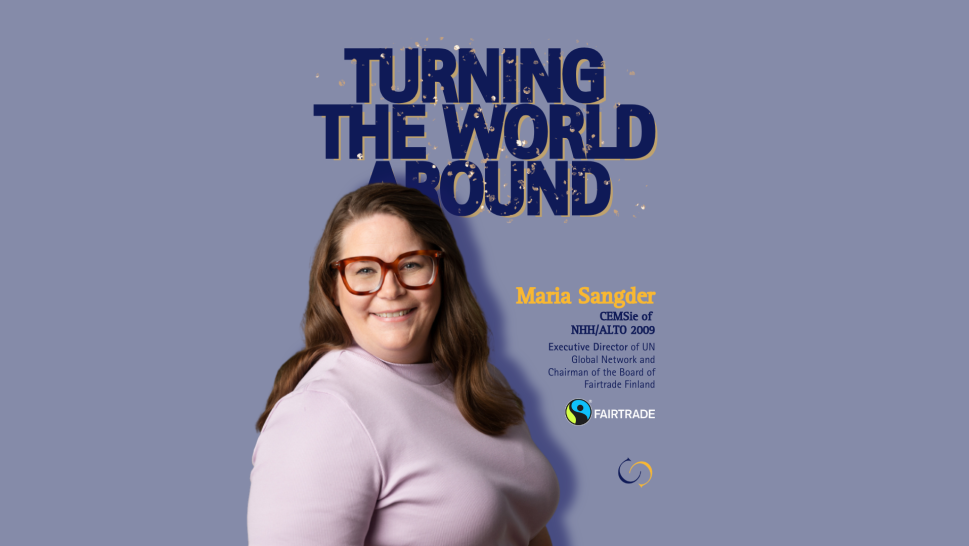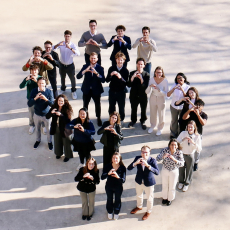A living wage is the minimum hourly, weekly or monthly amount a worker needs to earn, during normal working hours, to support the essential needs of their family: things like food, water, sanitation, clothing, housing – the core necessities of life. Yet according to Amnesty International, just shy 242 million people around the world don’t make enough money to enjoy a decent standard of living. What’s more, in 2025 there are still no countries in the world that legally oblige employers to pay a real living wage—a wage that is formally pegged to the real cost of living.
Working poverty is a human rights issue.
And it is the issue that sits at the core of the Fairtrade organisation, says Maria Sangder, Executive Director of UN Global Compact Network Finland, CEMS alumnus and Chairman of the Board of Fairtrade Finland.
In Finland, Fairtrade is piloting a new approach to addressing human rights risks in the country’s seasonal berry industry, she explains: “Berries grow freely in the forests of Finland, and local companies typically hire seasonal workers from Thailand and elsewhere, to pick them. We are rolling out a nationwide pilot, collaborating with the whole supply chain, to support fair and decent conditions for these people.”
Fairtrade Finland’s core mission is to support producers in low- and middle-income countries by promoting sustainable livelihoods and decent working conditions through certification. It offers local retailers and manufacturers the chance to opt in to purchasing and selling certified products and ingredients—Fairtrade cocoa, coffee, flowers, sugar, cotton as well as wine, spices, and fruits. In exchange, these manufactures are entitled to use Fairtrade certification mark.
“This is a brand with real clout,” says Maria. “We operate and insist on super strict criteria for farmers in overseas markets, so that Finnish manufactures that opt in know they are working to make trade fairer for the people who grow our food. We own our certification programme which means we can ensure that farmers and producers conform to our standards. And when local manufactures partner with us to purchase from Fairtrade suppliers, they can be confident that the farmers have received at least the Fairtrade Minimum Price and the Fairtrade Premium for their products—ensuring a more equitable trade...”
It’s easy to find time to commit to your passion
Fairtrade Finland punches above its weight in the global Fairtrade network: despite being a small market, it is one of the most significant branches—known for its ambitious and innovative approach, she adds. Here there are plans afoot to roll out a slew of development cooperation programmes in tandem with the Finnish government, to build capabilities for suppliers in Africa among other priorities. But while they work with government, it is end-consumers who provide the bulk of Fairtrade’s finance, says Maria.
“The biggest impact for certified farmers comes from high-volume products purchased by households and customers, and so customer awareness is a major priority for the organisation. We have a real mission to get people thinking about the supply chain and asking critical questions about where food comes from and if it’s grown locally, is it grown fairly. It’s a message that we want to promulgate as loudly and broadly as possible.”
Maria took up her role as Chairman of Fairtrade Finland in January 2025, and was nominated for the position on the back of her consolidated experience as CEO of Gaia Consulting, and Finnish-based consultancy focused on sustainable business and development.
“I was invited to give a talk on renewing and transforming value-based organisations at a business breakfast event, where I met the Executive Director at Solidarisuus, a NGO launched in 1970. Solidarisuus works for women’s rights in East Africa, against gender-based violence, and promoting sustainable livelihoods. They then invited me to speak at one their events and then referred me to the selection committee for the Fairtrade Board. When the position was offered to me, I could see the instant synergies and possibilities; I could see the alignment. I felt an immediate sense of curiosity and I wanted to see what I could do to support this challenging work.”
Being a non-executive Chairman does imply a certain degree of juggling, that said. And although the role does not require her to get involved in the day-to-day management of the organisation, there is still a significant commitment required of Maria to plan a monthly one-to-one with her CEO and chair a minimum of five yearly meetings.
“For me, the timing has been great as I’ve taken a sabbatical to transition from my last job into a new position with the United Nations as Executive Director of UN Global Impact. Even so, you have to organise and dedicate your time responsibly. It falls to me, for instance, to ensure that the organisation is doing what it is supposed to do—which is not difficult in the case of Fairtrade Finland as they are exceptionally well structured and efficient. I do lend my support to certain issues as they arise. But I believe it’s easy to find time for something when you are passionate about it and you feel the desire to commit to it.”
Who am I doing this for?
Having impact—doing something “different” – is a motivating principle that has underscored Maria’s career. From her earliest experiences as a student, working in FMCG, sales and marketing through to her undergraduate placement “immersed in FMCGs,” on to her decision to pursue her CEMS Masters and into her first serious position working for Nielsen in the grocery sector, she has been driven by a love of learning and delivering meaningful change. Her actual pivot into sustainable work was the product of a conversation with a friend over brunch, she says.
“We were talking about management consultancy and I just asked myself the question: am I locked into FMCGs or is there something else for me? And on the basis of that hunch, I got a job with a consultancy in my native Finland and spent a good 10 years really getting into strategy. After I had a baby, I was approached by a partner of a smaller firm specialising in sustainable business and everything just clicked into place. The business was doing terrific things in operational sustainability and asked me to come in to help build the strategic sustainability practice.”
It was an opportunity to connect the dots between her undergraduate interests in foreign direct investment, fair-for-all commerce and a flair for working with diverse stakeholders—the latter something that she was able to develop during her time as a CEMSie.
“CEMS is just so well designed to create a sense of community both within your home university and across nations. It’s built to expose you to and help you understand perspectives different to your own. That and the challenge that CEMS gives us to ask yourself the really big, really important questions: who am I doing this for? Why am I doing this? And who can I work with? These are the core elements of the CEMS experience that ground you – and that ground you within a remarkable, lifelong international community.”
Give yourself space
Giving back is a sentiment that Maria connected with during her time at CEMS, an experience that gave her “so much,” she says. And in the spirit of giving back, she is keen to share insights with younger generations pondering their first or next professional move in a turbulent point in history.
“You can’t know in your 20s what is going to help you through to the next stage of life or not, so it’s really about finding what interests you, doing your best and the rest will follow. And to do that you need to have ambition for sure, but you also need to give yourself space. Enjoy it and do what you love doing.”
If anyone had asked a 20-year-old Maria if she saw herself as a future Chairman of Fairtrade, or Executive Director of UN Global Compact Network Finland she would “very likely have laughed!” But her personal trajectory has been the product of mapping passion to opportunity and grasping both firmly.
“My latest transition professionally will be going from CEO of an organisation of 80 employees and senior executives in a corporation, to leading a network of just eight people. It’s a pivot, but it’s also a huge opportunity to learn, to grow and to deliver extraordinary impact. And just like the time that I donate to Fairtrade, these are the experiences that shape me, and that that keep me optimistic and moving forward.”
If optimism feels like it could be in short supply right now, the best option is to focus on channelling our efforts into actions, says Maria; by concentrating on the small steps forward and supporting those organisations that are fighting the right fight and moving in the right direction.
“Optimism is built into me. It’s what keeps me going. And I’d encourage others to simply focus on what you can do and make the best choices. Focus on the options or the solutions that simply are the next best steps, knowing that there are no perfect choices in this life. Young people in particular should seek out reasons to feel optimistic, and perhaps this is the way to think about it: You have power in your choices and you do have choices in front of you. You can be the generation that turns our world around.”
Maria’s top 3 practical advice to CEMSies:
- Build networks and collaborate. The best and most impactful changes have been achieved through cooperation between companies, political actors, civil society organizations, and other actors
- Gather information as broadly as possible from different perspectives and sources. From our own tools, we particularly recommend the Fairtrade Risk Map - a supply chain risk mapping tool aligned with UNGP's, including information also on impactful ways to address and remediate human rights abuses
- Focus and choose. No one can save the whole world. Choosing Fairtrade products is an easy, small act of responsibility in everyday life.




